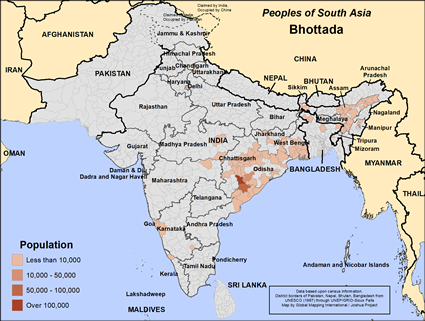The Bhottada or Bhottara are a tribal people who live in west central India. Their name comes from words meaning "land" and "chase." They are thought to be among the original inhabitants of their region of India. Illiteracy is a major Bhottara problem since only 37% of the men and 11% of the women can read and write. They speak Kuvi among themselves and Odia with outsiders. They are a Scheduled Caste, which means they are eligible for special public jobs and college admission.
The primary occupation of the Bhottara is agriculture. They grow rice in paddies and ragi, also called finger millet. The Bhottara supplement their food supply by hunting, fishing and raising animals. They build their huts near streams to have a continual water source. The Bhottara weave bamboo baskets to use and trade. In times of scarcity they will collect food from the forest. In multiethnic villages they live in an area by themselves so as to not lose their identity.
Almost all Bhottara live in the Indian state of Odisha. A few others live in areas around the nation of India.
In the distant past the Bhottara were a hunter-gatherer people. Hundreds of years ago, they settled down to live in villages in the hills and forests of Odisha.
The Bhottara are a strictly endogamous people. Cousin marriages are common. Parents arrange marriages for the young people. The parents of the groom pay a bride price in money and goods to the family of the bride. Newly married couples live near the family of the groom. Sons inherit the property of their father. If the family has no sons, the daughters gain the property. Women hold a higher status than in most Indian tribal societies. Their own priests and elders officiate at important life ceremonies like births, weddings and funerals. If children die, they are buried in a far off section of the forest. Adult dead are cremated.
The main foods of the Bhottara are rice, millet, fish, tubers and seasonal vegetables.
Bhottara live in rural villages without electricity or indoor plumbing.
Some experts classify the Bhottara are Hindus while others say they are animists. The Bhottara practice elements of both belief systems. They attempt to appease evil spirits and the spirits of their ancestors with offerings of prayer, liquor and food. Each village also has a shrine to Hindu gods such as Shiva, the destroyer god, Durga, the mother-earth goddess and Kali, the goddess of death, violence and sex.
The Bhottara participate in the yearly Hindu holidays such as Holi, the festival of colors, Diwali the festival of lights and Navratri, the celebration of autumn.
The Bhottara have tremendous spiritual and physical needs. Most of all they need to hear the message of Jesus Christ in an oral form since so few of them can read. They would benefit by Christian workers who could help educate their children and introduce modern medicine. Agricultural experts could increase crop yields that would give the Bhottara a surplus to buy things they need.
Pray for the Holy Spirit to work powerfully through those ministering to the Bhottara people.
Pray for a movement to Jesus to multiply among Bhottara families and communities.
Pray that God will overthrow spiritual forces of darkness opposing the spread of His Gospel among the Bhottara.
Scripture Prayers for the Bhottada in India.
ethnologue.com/language/bgw
peoplegroups.org/explore/GroupDetails.aspx?peid=41510#topmenu
thetide.org/bhottada-new-language/
| Profile Source: David Kugel |











